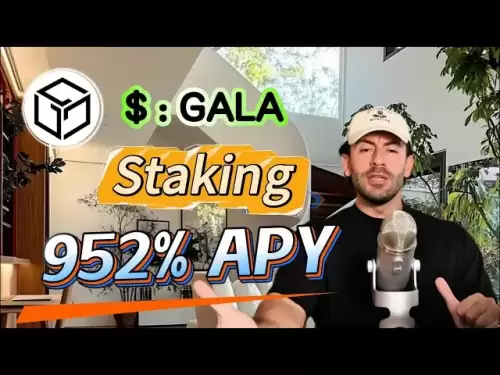-
 Bitcoin
Bitcoin $114500
-0.31% -
 Ethereum
Ethereum $3648
1.11% -
 XRP
XRP $3.033
-0.27% -
 Tether USDt
Tether USDt $0.9999
-0.01% -
 BNB
BNB $758.5
-0.32% -
 Solana
Solana $167.5
1.48% -
 USDC
USDC $0.9998
-0.02% -
 TRON
TRON $0.3331
0.74% -
 Dogecoin
Dogecoin $0.2039
0.25% -
 Cardano
Cardano $0.7419
-0.46% -
 Hyperliquid
Hyperliquid $39.21
2.66% -
 Stellar
Stellar $0.4049
-1.95% -
 Sui
Sui $3.483
-0.56% -
 Bitcoin Cash
Bitcoin Cash $570.8
2.89% -
 Chainlink
Chainlink $16.67
-0.57% -
 Hedera
Hedera $0.2470
-1.57% -
 Ethena USDe
Ethena USDe $1.001
0.00% -
 Avalanche
Avalanche $22.36
1.52% -
 Litecoin
Litecoin $123.4
4.35% -
 UNUS SED LEO
UNUS SED LEO $8.989
0.09% -
 Toncoin
Toncoin $3.324
-2.40% -
 Shiba Inu
Shiba Inu $0.00001219
-1.30% -
 Uniswap
Uniswap $9.811
2.54% -
 Polkadot
Polkadot $3.662
-0.07% -
 Monero
Monero $295.5
-3.85% -
 Dai
Dai $1.000
0.01% -
 Bitget Token
Bitget Token $4.345
0.24% -
 Cronos
Cronos $0.1380
0.95% -
 Pepe
Pepe $0.00001044
-1.14% -
 Ethena
Ethena $0.5981
-4.24%
How to view gas fees in Trust Wallet? How to save transaction costs?
To view gas fees in Trust Wallet, initiate a transaction, review the estimated fee, and consider timing your transactions during off-peak hours to save costs.
May 07, 2025 at 08:22 am

How to View Gas Fees in Trust Wallet? How to Save Transaction Costs?
Trust Wallet is a popular mobile cryptocurrency wallet that supports a wide range of digital assets and blockchain networks. One of the critical aspects of using such wallets is understanding and managing gas fees, which are transaction costs associated with blockchain operations. This article will guide you through the process of viewing gas fees in Trust Wallet and provide strategies to save on transaction costs.
Understanding Gas Fees in Trust Wallet
Gas fees are payments made to miners or validators on a blockchain network for processing transactions. These fees vary depending on the network's congestion and the complexity of the transaction. In Trust Wallet, gas fees are particularly relevant when you are interacting with networks like Ethereum, Binance Smart Chain, and others that use similar fee structures.
To view gas fees in Trust Wallet, you need to initiate a transaction. Here's how you can do it:
- Open Trust Wallet on your mobile device.
- Select the cryptocurrency you wish to send or interact with.
- Tap on 'Send' to start the transaction process.
- Enter the recipient's address and the amount you want to send.
- Review the transaction details, where you will see the estimated gas fee displayed.
The gas fee is usually shown in the native token of the blockchain network, such as ETH for Ethereum or BNB for Binance Smart Chain. This fee can fluctuate based on network conditions, so it's essential to check it before confirming your transaction.
Strategies to Save on Transaction Costs
Saving on transaction costs is crucial for frequent users of blockchain networks. Here are some effective strategies to minimize your gas fees in Trust Wallet:
Timing Your Transactions
Network congestion significantly impacts gas fees. During peak times, such as when new tokens are launched or major announcements are made, the demand for transaction processing increases, leading to higher fees. To save on costs:
- Monitor network activity using tools like Etherscan for Ethereum or BscScan for Binance Smart Chain.
- Schedule your transactions during off-peak hours, typically late at night or early in the morning, when fewer users are active.
Adjusting Gas Prices
Trust Wallet allows you to manually adjust the gas price for your transactions. By setting a lower gas price, you can reduce your costs, but this may result in longer transaction times. Here's how to adjust gas prices:
- Initiate a transaction as described earlier.
- Tap on 'Advanced Options' or a similar setting, depending on your Trust Wallet version.
- Adjust the gas price to a lower value. Be cautious, as setting it too low might delay your transaction significantly.
Using Layer 2 Solutions
Layer 2 solutions are protocols built on top of existing blockchains to improve scalability and reduce transaction costs. For Ethereum users, options like Optimism, Arbitrum, and Polygon can significantly lower gas fees. To use these solutions in Trust Wallet:
- Ensure your wallet supports the Layer 2 network you wish to use.
- Add the network to your Trust Wallet by going to 'Settings' > 'Networks' > 'Add Custom Network'.
- Enter the network details provided by the Layer 2 solution's documentation.
- Conduct transactions on the Layer 2 network, which will have lower gas fees compared to the main Ethereum network.
Batching Transactions
If you need to perform multiple transactions, batching them into a single transaction can save on gas fees. This is particularly useful for smart contract interactions. Here's how to batch transactions:
- Identify the transactions you want to batch, such as multiple token transfers or smart contract calls.
- Use a smart contract that supports batching, or write your own if you have the necessary skills.
- Initiate the batched transaction in Trust Wallet, ensuring all actions are included in one go.
Viewing Gas Fees for Different Networks
Trust Wallet supports multiple blockchain networks, each with its own fee structure. Here's how to view gas fees for different networks:
Ethereum Network
For Ethereum transactions, the gas fee is calculated based on gas limit and gas price. The gas limit is the maximum amount of gas you're willing to use for the transaction, while the gas price is the amount you're willing to pay per unit of gas.
- Initiate an Ethereum transaction in Trust Wallet.
- Check the gas fee displayed in ETH, which is the product of the gas limit and gas price.
Binance Smart Chain
Binance Smart Chain uses a similar fee structure to Ethereum but typically has lower fees. To view gas fees:
- Start a transaction on the Binance Smart Chain in Trust Wallet.
- Look at the estimated gas fee in BNB, which is calculated based on the network's current conditions.
Other Networks
For other supported networks like Polygon or Solana, the process is similar:
- Select the network in Trust Wallet.
- Initiate a transaction and review the estimated gas fee in the network's native token.
Additional Tips for Managing Gas Fees
Beyond the strategies mentioned, here are some additional tips to help you manage gas fees effectively:
Using Gas Fee Estimators
Gas fee estimators are tools that predict the optimal gas price for your transaction based on current network conditions. While Trust Wallet does not have a built-in estimator, you can use external tools like EthGasStation or GasNow to get an idea of the best gas price to use.
- Visit a gas fee estimator website before initiating your transaction.
- Note the recommended gas price and use it when setting your transaction in Trust Wallet.
Keeping Your Wallet Updated
Regularly updating your Trust Wallet ensures you have access to the latest features and optimizations that can help manage gas fees more effectively. To update:
- Open the app store on your device (Google Play Store for Android or Apple App Store for iOS).
- Search for Trust Wallet and check for updates.
- Install the latest version to benefit from any new features or improvements related to gas fee management.
Understanding Transaction Types
Different types of transactions can have varying gas fee requirements. For example, simple token transfers usually have lower fees than smart contract interactions. Understanding the nature of your transaction can help you anticipate and manage costs better.
- Identify the type of transaction you are performing.
- Research the typical gas fees associated with that transaction type on the specific network you are using.
Frequently Asked Questions
Q: Can I set a custom gas limit in Trust Wallet?
A: Yes, you can set a custom gas limit in Trust Wallet. When initiating a transaction, go to 'Advanced Options' and adjust the gas limit according to your needs. Be cautious, as setting it too low might cause the transaction to fail.
Q: How do I know if my transaction is stuck due to low gas fees?
A: If your transaction is stuck, it might be due to setting a gas price that is too low for the current network conditions. You can check the status of your transaction on a blockchain explorer like Etherscan or BscScan. If it remains 'Pending' for an extended period, consider resubmitting with a higher gas price.
Q: Are there any risks associated with using Layer 2 solutions to save on gas fees?
A: While Layer 2 solutions can significantly reduce gas fees, there are some risks to consider. These include potential security vulnerabilities in the Layer 2 protocol, the need to bridge funds back to the main network, and the possibility of delays in transaction finality. Always research and understand the specific Layer 2 solution you are using.
Q: Can I use Trust Wallet to view gas fees for all supported networks?
A: Yes, Trust Wallet allows you to view gas fees for all supported networks. The process is similar across different networks, where you initiate a transaction and review the estimated gas fee displayed in the network's native token.
Disclaimer:info@kdj.com
The information provided is not trading advice. kdj.com does not assume any responsibility for any investments made based on the information provided in this article. Cryptocurrencies are highly volatile and it is highly recommended that you invest with caution after thorough research!
If you believe that the content used on this website infringes your copyright, please contact us immediately (info@kdj.com) and we will delete it promptly.
- Decentralized Provers Take Center Stage: Mainnet Launches and Network Growth
- 2025-08-06 00:30:12
- ElevenLabs, AI Music, and Artist Licensing: Navigating the New Soundscape
- 2025-08-06 00:30:12
- Crypto Presales to Watch: WeWake Finance & the Rise of User-Friendly Web3
- 2025-08-06 00:35:12
- Uniswap Valuation Under the Microscope: Bitwise CIO's Perspective
- 2025-08-05 23:10:12
- Coinbase's $2 Billion Convertible Notes: A Bold Move or Risky Bet?
- 2025-08-05 23:10:12
- BlockchainFX ($BFX): Your Last Chance at a 100x Crypto Presale?
- 2025-08-05 23:50:12
Related knowledge

How to add TRC20 token to Trust Wallet?
Aug 04,2025 at 11:35am
Understanding TRC20 and Trust Wallet CompatibilityTrust Wallet is a widely used cryptocurrency wallet that supports multiple blockchain networks, incl...

What is a watch-only wallet in Trust Wallet?
Aug 02,2025 at 03:36am
Understanding the Concept of a Watch-Only WalletA watch-only wallet in Trust Wallet allows users to monitor a cryptocurrency address without having ac...

Why can't I connect my Trust Wallet to a DApp?
Aug 04,2025 at 12:00pm
Understanding DApp Connectivity and Trust WalletConnecting your Trust Wallet to a decentralized application (DApp) is a common process in the cryptocu...

How to fix a stuck pending transaction in Trust Wallet?
Aug 03,2025 at 06:14am
Understanding Why Transactions Get Stuck in Trust WalletWhen using Trust Wallet, users may occasionally encounter a pending transaction that appears t...

What is a multi-coin wallet in Trust Wallet?
Aug 03,2025 at 04:43am
Understanding Multi-Coin Wallets in Trust WalletA multi-coin wallet in Trust Wallet refers to a digital wallet that supports multiple cryptocurrencies...

How to switch between networks in Trust Wallet?
Aug 02,2025 at 12:36pm
Understanding Network Switching in Trust WalletSwitching between networks in Trust Wallet allows users to manage assets across different blockchains s...

How to add TRC20 token to Trust Wallet?
Aug 04,2025 at 11:35am
Understanding TRC20 and Trust Wallet CompatibilityTrust Wallet is a widely used cryptocurrency wallet that supports multiple blockchain networks, incl...

What is a watch-only wallet in Trust Wallet?
Aug 02,2025 at 03:36am
Understanding the Concept of a Watch-Only WalletA watch-only wallet in Trust Wallet allows users to monitor a cryptocurrency address without having ac...

Why can't I connect my Trust Wallet to a DApp?
Aug 04,2025 at 12:00pm
Understanding DApp Connectivity and Trust WalletConnecting your Trust Wallet to a decentralized application (DApp) is a common process in the cryptocu...

How to fix a stuck pending transaction in Trust Wallet?
Aug 03,2025 at 06:14am
Understanding Why Transactions Get Stuck in Trust WalletWhen using Trust Wallet, users may occasionally encounter a pending transaction that appears t...

What is a multi-coin wallet in Trust Wallet?
Aug 03,2025 at 04:43am
Understanding Multi-Coin Wallets in Trust WalletA multi-coin wallet in Trust Wallet refers to a digital wallet that supports multiple cryptocurrencies...

How to switch between networks in Trust Wallet?
Aug 02,2025 at 12:36pm
Understanding Network Switching in Trust WalletSwitching between networks in Trust Wallet allows users to manage assets across different blockchains s...
See all articles

























































































